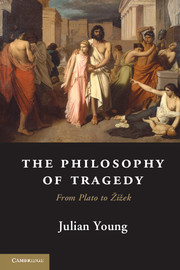Book contents
Introduction
Published online by Cambridge University Press: 05 June 2013
Summary
Tragedy has always fascinated philosophers. In what follows I attempt to provide an account of what, over the past two and a half millennia, they have had to say about it. What has fascinated above all is the paradoxical character of our enthusiasm for tragedy. Tragic drama portrays the destruction of individuals who are, if not always perfect, at least outstanding, the finest among us. It portrays, that is, distressing events, events which presumably give rise to the ‘negative’ emotion of distress. Yet our enthusiasm shows that there must be something beneficial, something ‘positive’, we derive from tragedy. Generally philosophers have believed that to outweigh the distress, the benefit must be very important indeed, so important as to render tragedy the highest form of literature, frequently of all art. Schelling coined the phrase ‘tragic effect’ to designate this benefit, and the question of just what it consists in will be the focal concern in the following chapters.
In the main, philosophers have given one of two kinds of answer to the question of the tragic effect. They have located it either on the level of sense and emotion or on the level of intellect and cognition. The tragic effect has been identified either as a special kind of (possibly bittersweet) pleasure – ‘tragic pleasure’, as I shall say – or else as the acquisition of some kind of knowledge. The two kinds of effect are not, of course, mutually exclusive and some philosophers, we shall see, have allowed ‘the’ tragic effect to embrace both kinds of effect.
- Type
- Chapter
- Information
- The Philosophy of TragedyFrom Plato to Žižek, pp. 1 - 2Publisher: Cambridge University PressPrint publication year: 2013



